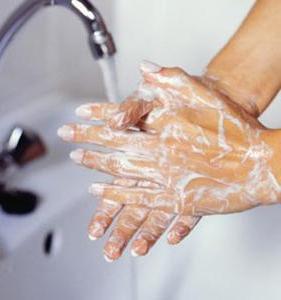 A national hand washing survey reveals more Americans are simply rinsing their hands with water instead of soaping up after using a public restroom. 70 percent admit they’ve skipped the important cleansing step. Two years ago when the question was asked only 54 percent confessed to just rinsing with water.
A national hand washing survey reveals more Americans are simply rinsing their hands with water instead of soaping up after using a public restroom. 70 percent admit they’ve skipped the important cleansing step. Two years ago when the question was asked only 54 percent confessed to just rinsing with water.
In addition, more Americans say they’ve seen someone else leave a public restroom without washing their hands at all. This year, 81 percent witnessed a non-washing event compared to 74 percent last year.
While most Americans don’t do anything after seeing someone skip hand washing, others do take action. Respondents say they avoid contact with anything the non-washer touched, wash their own hands more thoroughly and in general avoid the person.
The findings are part of the fifth annual Healthy Hand Washing Survey conducted by Bradley Corporation, a manufacturer of commercial plumbing fixtures, washroom accessories, emergency fixtures and solid plastic lockers.
The survey also shows that Americans go to great lengths to avoid coming into contact with germs in a public restroom. They commonly employ such tactics as: operate the toilet flusher with their foot (64 percent do so); use a paper towel when touching the restroom door (60 percent) and faucet handles (37 percent); and open and close doors with their hip (48 percent).
“Good ‘hand hygiene’ is one of the most important, and easiest, things we can do to reduce our own risk of getting sick and of spreading germs to others. Thorough hand washing, using soap and warm water for a good 20 seconds, is highly effective in removing bacteria, viruses and other disease-causing microorganisms from the surface of our skin,” says medical microbiologist Michael McCann, Ph.D., a professor of biology and associate dean of the College of Arts and Sciences at Saint Joseph's University in Philadelphia.
Gender differences in hand washing
The survey highlights interesting disparities between men and women in their hand washing habits. Nearly three-fourths of women (74 percent) say they always wash their hands after using a public restroom compared to just 60 percent of men always do so.
When asked why they didn’t wash up, the number one reason women give is the use of hand sanitizer. Men cite the lack of soap as their primary reason, followed by an unclean sink or washbasin and then the use of hand sanitizer. Interestingly, men were almost two-and-a-half times more likely than women to say they didn’t wash up because they didn’t feel the need.
In addition, men are significantly more likely to see another man leave a public restroom without washing his hands. 38 percent of men say they frequently see someone leave without washing versus 25 percent women who report frequently seeing the same phenomenon.
“Men need to get the memo that hand washing is important no matter what,” says Jon Dommisse, director of global marketing & strategic development for Bradley Corporation. “You just can’t argue with the research that says it is the number one way to prevent illness and stay healthy.”
Hand washing IQ
Most Americans seem to understand the need to wash up since 95 percent say it’s important to wash your hands after using a public restroom. Parents also value the practice since 86 percent plan to talk to their children about hand washing before they go back to school. The top three messages parents say they’ll convey are: always wash your hands after using the restroom; always wash before eating; and hand washing prevents the spread of germs.
In addition, the survey shows that news reports about airborne or food-borne illnesses have an impact hand washing habits. More than half of Americans (57 percent) say they wash their hands more frequently or more thoroughly in response to news coverage. That finding is backed up by the fact that 66 percent report they increase or improve their hand washing in response to seasonal flu virus outbreaks.
Public restroom dissatisfaction
Unfortunately, more people than ever (63 percent) say they’ve had a particularly unpleasant experience in a public restroom due to the condition of the facilities. The top complaints were: a really bad smell (82 percent of respondents cited odors); toilets that were clogged or not flushed (79 percent had encountered toilet troubles); and an overall appearance that’s dirty, unkempt or old (73 percent noted this).
For businesses an unpleasant restroom experience creates negative perceptions. More than two-thirds of consumers believe a bad restroom indicates poor management, lowers their opinion of the company and shows the business doesn’t care about customers.
An unpleasant restroom can also translate into lost sales since 64 percent of Americans say they’ll either think twice about patronizing the business or will never frequent it again.
The Healthy Hand Washing survey queried 1,015 American adults Aug. 1-5 about their hand washing habits in workplace and public restrooms. Participants were from around the country, ranged in age from 18 to 65 and older, and were fairly evenly split between men and women (47 and 53 percent).
For more than 90 years, Bradley Corporation has designed and manufactured commercial washfountains, and today is the industry's exclusive source for plumbing fixtures, washroom accessories, restroom partitions, emergency fixtures and solid plastic lockers. Headquartered in Menomonee Falls, Wis., Bradley serves the commercial, industrial, health care, recreation, education, and corrections markets worldwide.
For more information, contact Bradley at 1-800-BRADLEY or www.bradleycorp.com.
